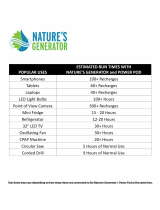
8
ECOWATER
S Y S T E M S
Installation
b. Place bypass valve(s) into “bypass” position. On a
single valve, slide the stem inward to BYPASS
(See Fig. 4 on page 6). On a 3 valve system,
close the inlet and outlet valves, and open the
bypass valve (See Fig. 3 on page 6).
c. Fully open the house main water pipe shutoff valve.
Observe a steady flow from both opened faucets.
d. Close both faucets.
e. Check your plumbing work for leaks and, if any are
found, fix right away. Be sure to observe previous
caution notes.
f. Turn on the gas or electric supply to the water
heater. Light the pilot, if applicable.
7. CONNECT TO ELECTRICAL POWER:
The filter works on 24 volt, 60 Hz electric power. The
included transformer changes standard 120 volt AC
house power to 24 volts. Plug the transformer into a
120V, 60 Hz electrical outlet. Be sure the outlet is
always “live” so it can not be switched off by mistake.
8. PROGRAM THE CONTROLLER
See pages 10-11 for instructions to program the elec-
tronic controller.
9. START UP PROCEDURE
a. Confirm that the filter’s main valve is in the “service”
position (“S” on the cam).
b. Place bypass valve(s) into “service”, EXACTLY as
follows:
= Single Bypass Valve: SLOWLY, pull the valve
stem outward to ”service” position, pausing sev-
eral times to allow the filter to pressurize slowly.
= 3 Valve Bypass: Fully close the bypass valve
and open the outlet valve. SLOWLY, open the
inlet valve, pausing several times to allow the
filter to pressurize slowly.
c. Check all connections for leaks.
d. Push and hold the RECHARGE button until the fil-
ter starts a RECHARGE NOW cycle. Verify that
the valve advances to “backwash” (BW) position.
e. Allow the unit to remain in “backwash” (BW) while
air is purged and water exits the drain line. Ensure
that the drain line is secure and will withstand the
mix of air and water exiting.
f. Allow the unit to complete the 15 minute “backwash”
cycle and automatically advance to the “aspirate” (A)
position. Allow it to remain there as it aspirates air
into the mineral tank. After 75 minutes, the filter will
then automatically return to “service”. Start up is
complete.
4. INSTALL GROUND CLAMP (IF NEEDED):
If the home’s cold water piping is being used for elec-
trical grounding, a 3 valve bypass system maintains
ground continuity. If you are using a single plastic
bypass valve, install the included ground clamp, as
shown In Figure 9, to maintain electrical ground conti-
nuity in the house cold water piping. Be sure the pipes
are clean, under the clamps, to assure good contact.
5. INSTALL VALVE DRAIN HOSE
a. Take a length of 5/8” inside diameter garden hose
and attach to the valve drain fitting (See Figure 4
on page 6).
b. Locate the other end of the hose at a suitable drain
point (floor drain, sump, laundry tub, etc.). Check
and comply with local codes. Refer to Figure 4 on
page 6 if codes require a rigid pipe drain run.
IMPORTANT: Use high quality, thick wall hose that
will not easily kink or collapse. The fil-
ter will not backwash properly if water
cannot exit this hose during recharges.
c. Tie or wire the hose in place at the drain point.
Water pressure will cause it to whip during the
backwash portion of the recharge cycle. Also pro-
vide an air gap of at least 1-1/2” between the end
of the hose and the drain point. An air gap pre-
vents possible siphoning of sewer water, into the
filter, if the sewer should back up.
d. If raising the drain hose overhead is required to get
to the drain point, do not raise higher than 8 feet
above the floor. Elevating the hose may cause a
back pressure that could reduce backwash flow
and proper mineral bed cleaning.
6. FLUSH PIPES AND TEST FOR LEAKS
CAUTION: To avoid water or air pressure damage to
filter inner parts, be sure to do the follow-
ing steps exactly as listed:
a. Fully open two filtered water faucets, one cold and
one hot, nearby the filter.
FIG. 9
Ground
Clamp
Inlet & Outlet
Pipes






















